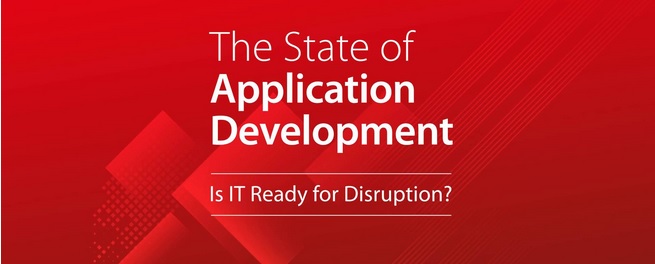LambdaTest announced the launch of the HyperExecute MCP Server, an enhancement to its AI-native test orchestration platform, HyperExecute.
The number of applications slated for delivery in 2019 has increased 60%, 38% of whom plan to deliver 25 or more apps this year, according to The State of Application Development, 2019: Is IT Ready for Disruption? a report from OutSystems based on survey results from more than 3,300 IT professionals in all industries across the world.

"Our 2019 survey shows that many IT departments are facing a multitude of disruptive forces when it comes to digital transformation and application development," said Steve Rotter, CMO for OutSystems. "The threat of digital disruption and the need for digital transformation has been a driver of IT strategy for years. Add to that the current uncertain global economic outlook, and it becomes obvious why business leaders are so concerned about agility today."
"Digital transformation dominates business strategy today, which is why web and mobile development demand is booming. Moreover, speed and agility are more important than ever before", Rotter added.
More survey findings include:
Steep development time
46% of respondents said the average time to deliver a web or mobile application is five months or more.
Backlogs remain
64% of IT professionals said they have an app dev backlog, and only 39% said their app dev backlog had improved in the past year.
Development talent hard to find and keep
Most respondents have hired developers, 75% of respondents described app dev talent as scarce, and only 36% of organizations have larger app dev teams than a year ago. The numbers appear to show retention of app dev talent is an equally grave concern.
Agile practices are still slow to mature
60% of organizations have invested in agile tools and services in the past year. However, the average agile-maturity score was a lackluster 2.7 out of 5, meaning most organizations are still in the process of defining agile processes.
Customer-centricity continues to rise
Over 60% of organizations have invested in customer-centric practices in the past year, including customer journey mapping, design thinking, and lean UX. For the new apps slated for development in 2019, those that will be used directly by customers or business partners were identified as most important.
Low-Code Has Become Mainstream
Another key research finding was that low-code is no longer just for innovators and early adopters. For example, 41% of respondents said their organization was already using a low-code application platform. And, a further 10% said they were about to start using one.
The analysis in the report identified that organizations using low-code are:
■ 26% more likely to describe their organization as satisfied or somewhat satisfied with the speed of application development
■ 11% more likely to deliver web applications in four months or less
■ 15% more likely to deliver mobile applications in four months or less
■ 20% more likely to score their agile maturity as level 3, 4 or 5
■ 12% more likely to say that their app dev backlog has improved since last year
■ Reporting a 16% higher self-assessment score for digital transformation maturity
Industry News
Cloudflare announced Workers VPC and Workers VPC Private Link, new solutions that enable developers to build secure, global cross-cloud applications on Cloudflare Workers.
Nutrient announced a significant expansion of its cloud-based services, as well as a series of updates to its SDK products, aimed at enhancing the developer experience by allowing developers to build, scale, and innovate with less friction.
Check Point® Software Technologies Ltd.(link is external) announced that its Infinity Platform has been named the top-ranked AI-powered cyber security platform in the 2025 Miercom Assessment.
Orca Security announced the Orca Bitbucket App, a cloud-native seamless integration for scanning Bitbucket Repositories.
The Live API for Gemini models is now in Preview, enabling developers to start building and testing more robust, scalable applications with significantly higher rate limits.
Backslash Security(link is external) announced significant adoption of the Backslash App Graph, the industry’s first dynamic digital twin for application code.
SmartBear launched API Hub for Test, a new capability within the company’s API Hub, powered by Swagger.
Akamai Technologies introduced App & API Protector Hybrid.
Veracode has been granted a United States patent for its generative artificial intelligence security tool, Veracode Fix.
Zesty announced that its automated Kubernetes optimization platform, Kompass, now includes full pod scaling capabilities, with the addition of Vertical Pod Autoscaler (VPA) alongside the existing Horizontal Pod Autoscaler (HPA).
Check Point® Software Technologies Ltd.(link is external) has emerged as a leading player in Attack Surface Management (ASM) with its acquisition of Cyberint, as highlighted in the recent GigaOm Radar report.
GitHub announced the general availability of security campaigns with Copilot Autofix to help security and developer teams rapidly reduce security debt across their entire codebase.
DX and Spotify announced a partnership to help engineering organizations achieve higher returns on investment and business impact from their Spotify Portal for Backstage implementation.
Appfire announced its launch of the Appfire Cloud Advantage Alliance.













